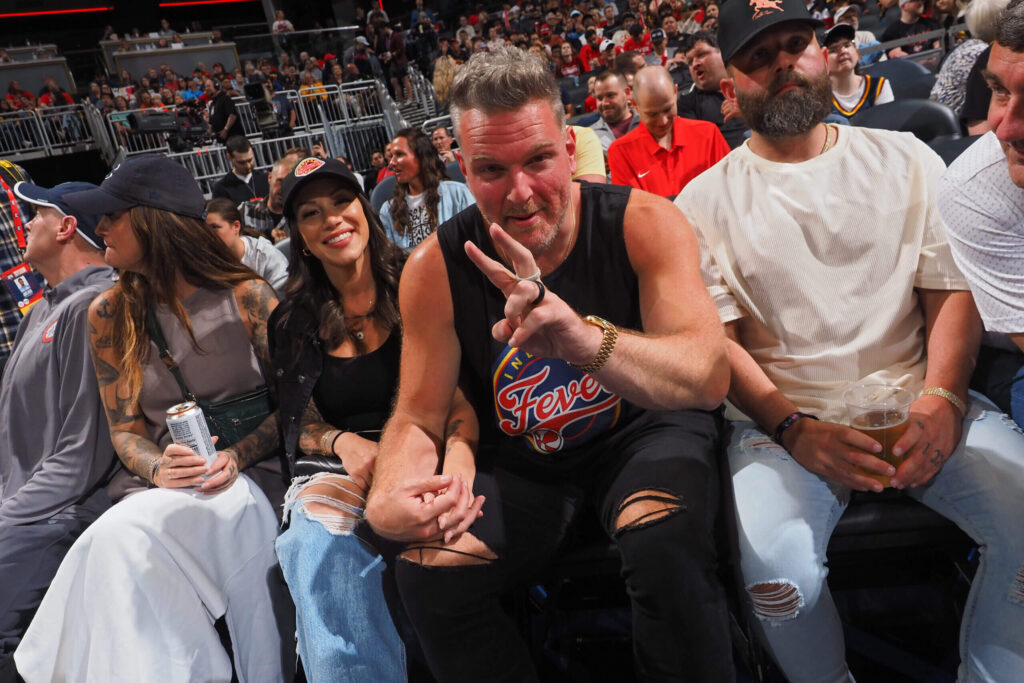The only place in the Disney media realm where you could get away with calling a 22-year-old woman a “white b—-” is on ESPN on weekday afternoons.
This is where “The Pat McAfee Show” lives and is broadcast all over North America. That’s where he decided to open his show on Monday by using that phrase to defend Caitlin Clark and the outcry over the low blows she receives as WNBA a rookie that sparked discussion about the roles race and celebrity play in Clark’s treatment within the league and in the media.
McAfeethe talented and foul-mouthed talk show host/”College GameDay” analyst/WWE commentator decided the best way to put an exclamation point on an opening monologue was to turn to the b-word:
“I wish the media would keep saying, ‘This rookie class, this rookie class, this rookie class,'” McAfee said. “No, let’s just call it what it is: There’s a white bitch for the Indiana team that is a superstar.
The network declined to comment. McAfee He later apologized in a message on X, saying he shouldn’t have used the term.
“My intentions in saying this were to be a compliment, as was the entire segment,” he wrote, “but a lot of people are saying that was definitely not the case at all. It’s 100% my fault and I apologize for it… I’ve also sent an apology to Caitlin.”
Let’s call a spade a spade: If you walked the halls of Bristol on Monday and described someone that way, ESPN’s human resources department would remind you of all the harassment videos you’re required to watch. You’d probably be suspended or worse.
ESPN can hide behind the fact that McAfee is not an employee. The network pays him more than $17 million a year, but leases his show, with McAfee retaining creative control. McAfee pays all of his employees, including recurring freelancers like Aaron Rodgers. But this was on ESPN. The technicalities of the deal don’t change that.
The internet, where McAfee got his start, first at Barstool Sports and with a relentless social media presence, has cruder sensibilities than those espoused by a company owned by Disney. McAfee may not have meant harm when he called Clark a “white b—-,” and he can point to the case of a WNBA player apparent use of the same wordbut he is not the one who decides who gets hurt.
The topic of Clark’s popularity gained momentum after the Chicago Sky‘s Chennedy Carter fouled Clark from behind during a game on Saturday, a flagrant fault who received criticism from Carter’s own coach. Carter seemed to be calling Clark the B word just before doing it too.
But talking on the court, among WNBA players, is different than talking out loud on the radio. It’s not the same thing.
McAfee wasn’t the only ESPN star who didn’t answer the call. WNBA Monday. Before McAfee on “First Take,” Stephen A. Smith got into a back-and-forth with basketball analyst Monica McNutt.

Caitlin Clark helped give the WNBA a resurgence. The discussion around that question on ESPN Monday didn’t live up to expectations. (Luke Hales/Getty Images)
Smith, the $12 million-a-year ESPN man, was chatting with McNutt about Clark when Smith said, “Who talks about the WNBA? Who talks more about women’s sports than First Take?”
McNutt seemed to want to be as respectful as possible to Smith, but she couldn’t help but dunk on him.
“Stephen A., with all due respect, with your platform, you could have done this three years ago if you wanted to,” McNutt said.
Smith looked like he had been hit by a left hook, which forced him to say, “Wow.”
For ESPN, the Clark talk has given the network a bridge between Smith’s highly rated “First Take” and McAfee’s show, which continues to struggle on linear TV, losing nearly 50% of Smith’s audience again in the past month (from 501,000 to 261,000), according to sources with access to Nielsen figures. ESPN likes to factor McAfee’s YouTube views into its ratings, which may have some credibility, but it’s different from how they’re officially calculated.
And McNutt was right about the WNBA’s history. Few people talked about the WNBA as much on live television before Clark came along.
Every sport wants to be talked about by the Smiths and McAfees of the world on ESPN. It’s the hub of daily sporting events, and the WNBA is now a regular topic of discussion in a way it wasn’t before, even on the network that has invested the most in women’s sports on television.
McAfee apologized. It was the right thing to do. Now we’ll see if the ESPN stars learned anything.
(Top photo by Pat McAfee: Ron Hoskins/NBAE via Getty Images)
